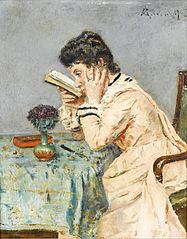You may have noticed that I’ve been posting less frequently, especially my book reviews. Fear not, I have not departed for illiterate climes. I value our community. And I do have things to say about the books I’ve been enjoying. I just have been reading and writing much less.
In mid-May, I experienced a sudden, severe decrease in the
visual acuity of my dominant eye. I’ve been to three doctors so far, including
a retinal specialist, and they can’t find the cause. The good news is that
they’ve been able to rule out the Big Bads, which is reassuring but
frustrating. I’ve tried wearing an eye patch, which gives me better vision
through my non-dominant eye, but the loss of depth perception drives me crazy.
(Who knew how much depth perception matters when reaching for a mouse?)
Meanwhile, my time at the computer is limited (ditto piano, unless I’m playing
from memory). Eyestrain headaches set in after only a short time. Hence…
Audiobooks to the rescue!
I discovered the delights of recorded books when they came
on reel-to-reel and then cassettes. And then CDs. I still have a collection of
my favorite novels and classes. Fast forward a number of years to oh joy! I can
not only check out physical audiobooks from my local library, I can borrow
digital editions, too! I got into borrowing through the discovery of many
podcasts featuring stories read aloud (my favorite was “Phoebe Reads A
Mystery”). Alas, these were usually one chapter per episode, liberally laced
with ads. Not so the library editions (which also pay royalties to the author
and narrator through the price the library pays for its copies).
I’ve worked my way through most of Alexander McCall Smith’s
books (especially the “Lady Detective Agency” series), Tony Hillerman’s
mysteries, and Anne Perry’s Thomas and Charlotte Pitt mysteries.
What have I been listening to recently? Read my most recent
audiobook reviews this Friday for the scoop!





